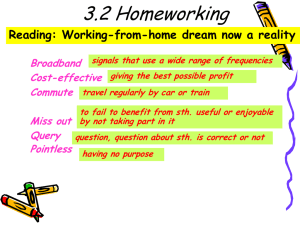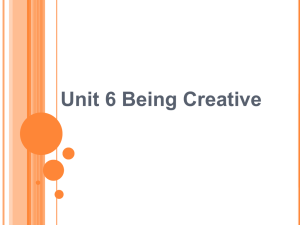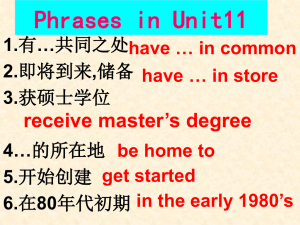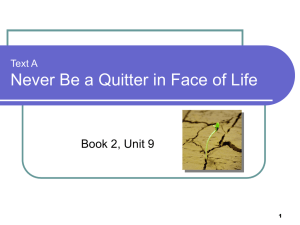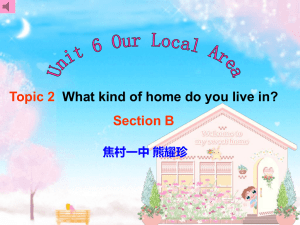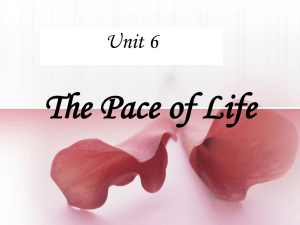Language Study Word
advertisement
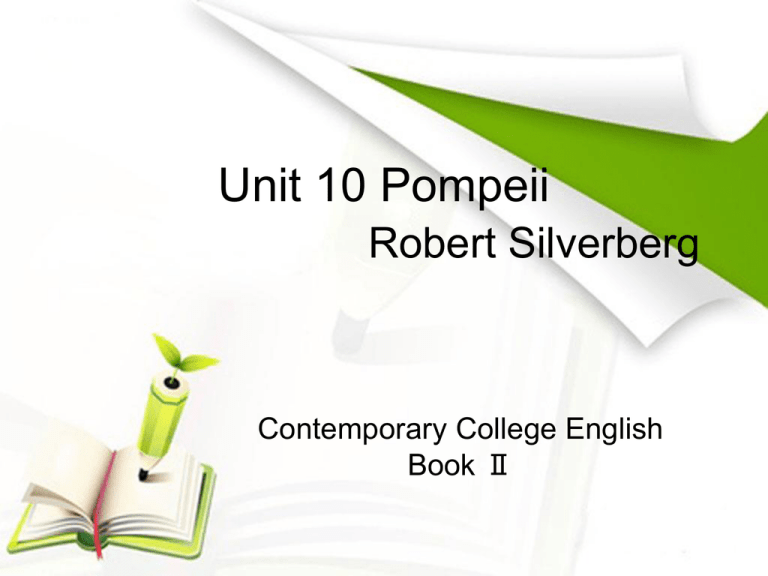
Unit 10 Pompeii Robert Silverberg Contemporary College English Book Ⅱ Contents 1 Warm-up 2 Background Information 3 Text Appreciation 4 Language Study 5 Extension 1 Warm-up Questions / Activities Warm-up Objectives Warm-up Questions / Activities 1). Why does the author call Pompeii a strange city? 2). What happened to the city? 3). What was the city like before it was destroyed? 4). What are some other natural disasters in world history that you have learned about? Warm-up Objectives 1). Understand the structure and the general idea of the text 2). Know something about the history of Pompeii and what happened in AD 79 3). Be able to use specific verbs to describe things 4). Be able to create a dominant impression by using words about five senses 5). Know something about natural disasters like volcanic eruptions, earthquakes, tornado etc. 2 Background Information Author Background Culture Tips Background Information Author His Life Robert Silverberg (born January 15, 1935) is an American author, best known for writing science fiction. In 1956 he graduated from Columbia University, having majored in Comparative Literature. Background Information Culture Tips Naples is the capital of Campania (坎泊尼亚) and the third-largest city in Italy, after Rome and Milan. It has a population of nearly one million within its administrative limits on a land area of 117.3 km2 (45 sq mi). The urban area of Naples extends beyond the administrative city limits, with a population of above three million. Background Information Culture Tips Naples Background Information Culture Tips The city of Pompeii is a partially buried Roman towncity near modern Naples. Pompeii was partially destroyed and buried under 4 to 6 m (13 to 20 ft) of ash and pumice(浮石) in the eruption of Mount Vesuvius in AD 79, and it was lost for nearly 1700 years before its accidental rediscovery in 1749. Since then, its excavation has provided an extraordinarily detailed insight into the life of a city during the Pax Romana(罗马 和平时期.) Background Information Culture Tips Today, this UNESCO World Heritage Site is one of the most popular tourist attractions of Italy, with approximately 2,500,000 visitors every year. (United Nations Education, Scientific and Culture Organization) Background Information Culture Tips Pompeii the Last Day A multidisciplinary study of the eruption products and victims indicates that at Vesuvius and surrounding towns, heat was the main cause of death of people, previously believed to have died from ash suffocation. The results of the study, published in 2010, show that exposure to at least 250 °C hot surges at a distance of 10 kilometers from the vent was sufficient to cause instant death, even if people were sheltered within buildings. Background Information Culture Tips Pompeii the Last Day Background Information Culture Tips Mount Vesuvius Mount Vesuvius is best known for its eruption in AD 79 that led to the burying and destruction of the Roman cities of Pompeii and Herculaneum(意大利南部古城. They were never rebuilt, although surviving townspeople and probably looters (掠夺者) did undertake extensive salvage(救援) work after the destructions. The towns' locations were eventually forgotten until their accidental rediscovery in the 18th century. Background Information Culture Tips Pompeii, with Vesuvius towering above Background Information Culture Tips Vesuvius from plane Inside the crater of Vesuvius Background Information Culture Tips Jupiter is the king of the gods and the god of sky and thunder. Jupiter was the chief deity (神) of Roman state religion throughout the Republican and Imperial eras, until the Empire came under Christian rule. Jupiter is thought to have originated as a sky god. His identifying implement is the thunderbolt(雷 电), and his primary sacred animal is the eagle, which held precedence(优先) over other birds in the taking of auspices(鸟卜者 ) and became one of the most common symbols of the Roman army. Background Information Culture Tips Apollo is one of the most important and complex Olympian deities in ancient Greek and Roman religion, Greek and Roman mythology. Apollo has been variously recognized as a god of light and the Sun, truth and prophecy, healing, plague, music, poetry, and more. Apollo is the son of Zeus and Leto, and has a twin sister, the chaste (贞洁)huntress (女猎手) Artemis. Background Information Culture Tips Jupiter Apollo Background Information Culture Tips Isis(埃及神话,爱希丝,生育与繁殖的女神) is a goddess in Ancient Egyptian religious beliefs. She was worshipped as the ideal mother and wife as well as the patron of nature and magic. She was the friend of slaves, sinners, artisans(工匠), and the downtrodden(被践踏), and she listened to the prayers of the wealthy, maidens, aristocrats, and rulers. Isis is also known as protector of the dead and goddess of children. Background Information Culture Tips The name Isis means “Throne”. Her headdress(饰 头巾) is a throne. As the personification of the throne, she was an important representation of the pharaoh‘s (法老)power. The pharaoh was depicted as her child, who sat on the throne she provided. Background Information Culture Tips Natural disasters We know that natural disasters have been reduced to mere statistics. But over the years people have also shown intense interest in them. For one thing, natural disasters cause a lot human tragedy, and human tragedy has always been a deep concern of human beings. Second, during a natural disaster, human beings usually reveal their true colors. We see ourselves at our best as well as at our worst. third, the careful study of natural disasters may reveal scientific laws which may eventually help man discover ways to deal with natural disasters better. Fourth, natural disasters are often linked with human errors, and therefore can lead to our better understanding of our mistakes and shortcomings. Background Information Culture Tips Natural disasters Fifth, the memory of natural disasters can always remind us that natural power is still much greater than human power, and it is stupid arrogance on our part to think that we can conquer nature. Man should forever be humble and learn to respect nature’s ways, and learn whatever other useful lessons from them. What is unique about this particular natural disaster is the fact the eruption destroyed a Roman city more than 2,000 years ago, but now the buried city is returned to us almost intact. What is unique about this particular natural disaster is the fact the eruption destroyed a Roman city more than 2,000 years ago, but now the buried city is returned to us almost intact. Background Information Culture Tips From the ash and rubble of the city we now see what this Roman City was like with every detail. Among the 2,ooo dead bodies we see men and women; old and young; rich and poor. We see gladiators, tourists, merchants, bakers. We see all kinds of buildings, including a brothel, and a bakery where there were still 81 loaves of bread left in the time of eruption. And in the buildings, we see furniture used at the time,domestic animals, and frescoes. No wonder Pompeii has become one of the most popular historical museums in the world. The present text is condensed from a much longer article that appeared in National Geographic many years ago. But even this much shortened version serves as a vivid introduction to this great archeological discovery. 3 Text Appreciation Text Analysis Structure Detailed Analysis Text Appreciation 1. Structure Part I: Para. 1-7 • A brief account of Pompeii before and after August 24, AD79. Part II: Para. 8-9 • A detailed description of what happened on the day of the eruption. Text Appreciation 2. Detailed Analysis Part I: Main Idea 1). What was the city like before the eruption? 2). What were people in Pompeii doing before the eruption? 3). If the city had not been destroyed by the volcanic eruption, what would it be like today? Text Appreciation Detailed Analysis Part I: Words Phrases erupt; strike; perish; shroud; intact; clatter; shimmer no other; come down; hide from; break through; be in place; come to life; be in port; clear away Sentence the day + that clause; to do …is to Pattern do.; …is all one needs to do. Grammar inversion Text Appreciation Detailed Analysis Part I: Sentence Paraphrase 1). Beneath the protecting shroud of ash, the city lay intact. (para 5.) Paragraphing: The city remained as it had been before the eruption. It had been protected by the thick layer of ash that buried the city deep. Text Appreciation Detailed Analysis Part I: Sentence Paraphrase 2). A good imagination is all you need to restore it to activity. (para. 7) Paraphrasing: If you have a good imagination you will be able to imagine what was going on - the sights, sounds, smells and activities of a busy, prosperous Roman town. Text Appreciation Detailed Analysis Part I: Exercises Translate the following sentences into English. 1).我的学校里没有别的美国人了。 There are no other Americans in my school. 2).他们最近已经从伦敦搬到乡村来住。 They've recently come down from London to live in the village. 3).你是不是有什么事要瞒着我? Are you trying to hide something from me? Text Appreciation Detailed Analysis Part I: Exercises 4).不久,绿色的嫩芽就会破土而出。 Soon, tiny green shoots will break through the soil's surface. 5).书都放得整整齐齐,井井有条。 The books were all neatly in place, carefully arranged. 6).一个年轻女孩翻阅着家庭相册,童年记忆重回眼前 A young girl's childhood memories come to life as she thumbs through her family photograph album. Text Appreciation Detailed Analysis Part II: Main Idea 1). What did people do after eruption? 2). What caused the greatest loss of life? 3). Did anyone survive the volcanic eruption? How did they manage to do it? 4). What would you do if you had been there in Pompeii? Text Appreciation Detailed Analysis Part II: vine-covered; summit; reverberate; Words pumice; overwhelm; cluster break loose; blow up; branch out; die away; go by; be at hand; make one’s Phrases way; be in store; lose consciousness; shower of stones Sentence Pattern Grammar past participle as attributive Text Appreciation Detailed Analysis Part II: Sentence Paraphrase 1). The sound of the explosion died away, but it still reverberated in everyone’s ears. (para. 13) Paragraphing: Even when the loud sound stopped, people did not recover from the shock. 2). An hour went by and darkness still shrouded everything. (para. 14) Paragraphing: An hour passed, things did not improve and darkness covered everything. Text Appreciation Detailed Analysis Part II: Sentence Paraphrase 3). Rushing throngs, blinded by the darkness and the smoke, rushed up one street and down the next, trampling the fallen in a crazy fruitless dash toward safety. (para. 17) Paragraphing: People panicked. They rushed into the streets to escape the falling buildings. It was dark and the air was full of smoke so they could not see where they are going. They rushed up one street and down the next in a hopeless attempt to reach safety. In their blind rush they ran over the bodies of people who had fallen down. Text Appreciation Detailed Analysis Part II: Exercises 1).一股巨大的力量即将迸发而出。 A mighty force was about to break loose. 2).他只得把火吹旺使它烧起来。 He had to blow up the fire to make it burn. 3).公司的业务从汽车零售扩大到汽车出租。 From car retail the company branch out into car leasing. Text Appreciation Detailed Analysis Part II: Exercises 4).台风过后,风渐渐平息了。 The winds died away after the typhoon had passed. 5).胜利即将到来。 Victory is at hand. 6).随着时光流逝,多少人来了又走,留下无尽故事。 As time goes by, numerous people come and go, with countless stories left here. Text Appreciation Detailed Analysis Part II: Exercises 7).我们设法从购物的人潮中挤过去。 We tried to make our way through the crowds of shoppers. 8).一场新的灾难即将向庞培袭来。 A new trouble was in store for Pompeii. 9).虽然我没有失去知觉,但那剧烈的疼痛确实难忍。 Though I did not lose my consciousness, the sharp pain was really killing me. 4 Language Study Words Key Points Phrases Language Study 一、Word List 1.Mighty 2.Overwhelm 3.Perish 4.Poisonous 5.Reverberate 6.Savage 7.Shatter 8.Shroud 9.Stumble 10.Topple 11.Trample 12.Regain Language Study 一、World List 13.Absorb 14.Band 15.Board 16.Branch 17.Collapse 18.Crouch 19.Descend 20.Drift 21.Flee 22.Hoof 23.Intact 24.Loaf 25.Strike Language Study 二、Phrases and Expressions 1. At hand 8. Branch out 2. Die away 9. Pour down 3. Plunge into 10. Make one’s way to 4. In store for 11. Descend on 5. Arm of 12. Restore sb/sth to sth 6. Come down from 13. Go over 7. Strike on 14. Blow up Language Study Word 1. Mighty Adj. a. very strong and powerful b. large and impressive Examples: a mighty warrior 威猛的斗士 the mighty Mississippi river 浩荡的密西西比河 He struck him with a mighty blow across his shoulder. 他猛地一下砸在他的肩膀上 2. Overwhelm Language Study Word v. 1). to cover sb./sth. Completely e.g.: A great wave overwhelmed the boat 。 2). to have such a strong emotional effect on sb. that it is difficult for them to resist or know how to react. (感情或感觉)充溢,难以禁受 e.g. :She was overwhelmed by feelings of guilt. The beauty of the landscape overwhelmed me. 2. Overwhelm Language Study Word 3). To defeat sb. Completely 4). to be so bad or so great that a person cannot deal with it; to give too much of a thing to a person. 压垮,使应接不暇 e.g.: We were overwhelmed by requests for information. ●Overwhelming Adj. 巨大的,压倒性的 e.g.: The evidence against him was overwhelming. Language Study Word 3. Perish v. 1). to be lost or destroyed 2). (people or animals) to die. especially in a sudden violent way 死亡,暴死 e.g.: A family of five perished in the fire. Early building were made of wood and have perished. ●perishable adj. 易腐烂的,易变质的 perishable foods/goods Language Study Word 4. Poisonous adj. 1). causing death or illness if swallowed or absorbed into the body 2). extremely unpleasant or unfriendly ● poisonous chemicals/plants poisonous snakes the poisonous atmosphere in the office Language Study Word 5. Reverberate v. 1). (sound) to be repeated several times as it is reflected off different surfaces . e.g.: His voice reverberated around the hall. 2). to seem to shake because of a loud noise. e.g.: The hall reverberate with the sound of music and dancing. Language Study Word 3). to have a strong effect on people for a long time or over a long area. e.g.: Repercussions (反响)of the case continue to reverberate through the finacial world. ● reverberation n. 影响 (广泛指消极的) Language Study Word 6. Savage adj. 1. fierce and violent 2. involving very strong criticism猛烈抨击的 3. an offensive way of referring to groups of people or customs that are considered to be simple and not highly developed.蒙昧 的,未开化的,野蛮的 e.g.: She had been badly hurt in what police described as ‘a savage attack’. Language Study Word 6. Savage e.g.: The article was a savage attack on the government’s record. savage can also be used as verb and noun. v. 1. to attack sb. violently 2. to criticism sb./sth. severely e.g.: She was savaged to death by a bear. Her latest novel has been savaged by the critics. n. 野蛮人,未开化人,凶狠残暴的人 Language Study Word 7.Shatter v. 1). to suddenly break into small pieces; to make sth. Suddenly break into small pieces e.g.: He dropped the vase and it shattered into pieces on the floor. The explosion shattered all the windows in the building. Language Study Word 2). to destroy sth. completely, especially sb’s feelings, hopes or beliefs; to be destroyed in this way. e.g.: Her experience of divorce shattered her illustrations about love. My whole world shattered into a million pieces. 3). to make sb. feel extremely shocked and upset. e.g.: The unexpected death of their son shattered them. Language Study Word 8. Shroud v. 1). to cover or hide sth. 2). to hide information or keep it secret and mysterious e.g.: The city was shrouded in mist. His family background is shrouded in mystery. Language Study Word 9.Stumble v. 1). to hit your foot against sth while you are walking or running and almost fall e.g.: The child stumbled and fell. 2). to walk or move in an unsteady way 跌跌撞撞的走 e.g.: We were stumbling around in the dark looking for a candle. Language Study Word 3). to make a mistake and stop while you are speaking or reading to sb. 结结巴巴的说话 e.g.: In her nervousness, she stumbled over her words. Language Study Word 10. Topple v. 1. to become unsteady and fall down; to make sth do this 使失去平衡而坠落,倒塌,倒下 2.to make sb lose her position of power or authority 推翻,颠覆,打倒 e.g.: He brushed past, toppling her from her stool. 他经过时蹭了她一下,使她从凳子上摔了下来。 a plot to topple the President (plot:阴谋) Language Study Word 11.Trample v. 1). to step heavily on sb./sth. so that you crush or harm them/it with your feet 2). to ignore sb’s feelings or rights and treat them as if they are not important e.g.: He was trampled to death by a runaway horse. The government is trampling on the views of ordinary people. Language Study Word 12.Regain v. 1). to get back sth you no longer have, especially an ability or a quality 重新获得,恢复 2). to get back to a place that you have left 回到返回 e.g.: The party has regained control of the region. They finally managed to regain the beach. Language Study Word 13.Absorb v. 1). to take sth into the mind and learn or understand it.理解,消化,吸收。 Eg.: It’s a lot of information to absorb all at once. 要一下子消化这么多资料,真是很难。 2). to take in a liquid, gas or other substance from the surface or space arround.吸收(液体, 气体)等 Eg.: Plants absorb oxygen. Language Study Word 3). to inerest sb very much so that they pay no attention to anything else. 吸收全部注意力;使全神贯注 Eg.: This work had absorbed him for several years. 这项工作曾使他沉迷了好几年。 4). to use up a large supply of sth,especially money or time.耗费,耗去(大量金钱,时间)等 Eg.:The new proposals would absorb $80 billion of the federal budget. 这些新提案将耗费八百亿元联邦政府预算。 Language Study Word 14.Band n. 1). A group of people who do sth together 一伙人,一帮人 Eg.: He persuaded a small band of volunteers to help. 他劝服了一小批志愿者来帮忙。 2). 流行音乐,乐队 Eg.: She is a singer with a band. 她是一个乐队的歌手。 3). a range of numbers, ages, prices, etc.withing which people or things are counted or measured (数目,年龄,价格)等范围,段 Language Study Word Eg. the 25-35 age band. 25 岁到35 岁的年龄段 ● Tax bands 税收等级 v. To be organized into bands of price,income etc. (将价格收入等等)划分档次,分等级 Eg.Tax is banded according to income. 赋税是按收入划分等级的。 ● Band together 联合携手 Local people banded together to fight the drug dealers. 当地人齐心协力打击毒品贩子。 Language Study Word 15.Board n 1). piece of wood 木板 Eg.he had ripped up the carpet,leaving only the bare boards . 他用力扯去地毯,只剩下裸露的地板. 2). a group of people who have power to make decisions and control a company or other organization(公司或其他机构)董事会,委员会,理 事会。 Eg. The board is/are unhappy about falling sales. 董事会对销售额下降表示不满。 Language Study Word ●Members of board 全体委员 ●Across the board 全体,整体,全面 ●Go by the board 被废弃,被忽视。 All her efforts to be polite went by the board and she started to shout. 她力图保持和颜悦色的一切努力都白费了,于是她开 始大喊大叫。 ●On board 在(船上,飞机上,火车上) Take sth on board 采取,采纳,接纳(主意,建议) Eg.I told her what I thought,but she didn’t take my advice on board. 我把我的想法告诉了她, 可是她没有听取我的建议。 Language Study Word 15.Board v. 1). To get on a ship,train,plan,bus The ship was boarded by customs officals . 海关官员登上了这艘船。 2). to leave and take meals in sb’s home,in return for a payment付费(在某人家里),膳宿 ●board at ....../with sb Eg. She always had one or two students boarding with her. 他的家总有一两名寄宿者。 Language Study Word 16.Branch v.To divide into two or more parts, especially smaller or less important parts 分开,分叉 eg.The accident happened the road branches. 事故发生在岔道处。 ● branch off ①分叉②改道,转道 1). eg.:Just after the lake, the path branches off to the right. 小路经过湖后,向右分出一条岔道。 ● branch out(into sth) 拓展(新业务),涉足(新工作) eg.:the company branched out into selling insurance. 该公司开展了保险销售业务。 Language Study Word 17.Collapse v. 1). to fall down or fall in suddenly(突然地)倒塌 The roof collapsed under the weight of snow. 房顶在雪的重量下突然坍塌 2). to fall down, especially because you are very ill/sick Eg.:he collapsed in the street and died two hours later. 3). to sit or lie down and relax, especially working hard(尤指工作劳累后)坐下,躺下放松 When I get home ,I like to collapse on the sofa and listen to music. Language Study Word 17.Collapse 4). to fail suddenly or compeletely 突然失败,崩溃,瓦解 Eg.: talks between management and unions have collapsed. 资方和工会的谈判已告破裂 n. 1). A sudden failure of sth, such as an institution, a business or a course of action 突然失败,倒闭,崩 溃(如机构,生意或行动的) The collapse of law and order in the area 该地区治安的瘫痪 2). A sudden fall in value突然降价;突然贬值;暴跌 The collapse of share prices/the dollar/the market 股票价格/美元/市场价格暴跌 Language Study Word 18.Crouch v. to push your body close to the ground by bending you legs under you.蹲,蹲下 Eg.: He crouched down beside her. 他在她的旁边蹲下来。 ●crouch over sth/sb 俯身接近 Eg.:He crouched over the papers on his desk. 他俯身看他桌上的文件。 n. a crouching position蹲着的姿势 She dropped to a crouch.她俯身蹲了下来。 Language Study Word 19.Descend v. 1). To come or go down from a higher to a lawer level下来,下去,下降 Eg.:the results,ranked in descending order 结果按递减顺序排列如下 2). To slope downwards 下斜,下倾 At this point the pass descends steeply. 小路从这里陡然而下 3). To arrive and begin to affac sb/sth降临,来临 Eg.: Night descends quickly in the tropics. 热带地区黑夜来得快 Language Study Word ●Be descended from sb 是某人的后裔 He claims to be descended from a spanish prince. 他声称是一位西班牙王子的后裔。 ●Descend into sth 逐渐陷入 The country was descending into chaos. 这个国家陷入一片混乱 ●Descend on sb/sth 突然大批来访 Hundreds of football fans descended on the city. 数百名足球迷蜂拥入城 ●Descend to sth 降低身份去做;竟做出 They descended to the level personal insults. 他们竟卑鄙到进行人身侮辱的地步。 Language Study Word 20.Drift n.1). a slow steady movement from one place to another; a gradual change from one situation to another, especially to sth bad. 流动,趋势,逐渐变化,(尤指向坏的方面) Eg.:a population drift away from rural areas 农村地区的人口外流 2). the movement of sea or air 气流,水流,流动 Eg.: the general direction of drift on the east coast. 东海岸海水的总体流向。 Language Study Word 20.Drift 3). the general meaning of what sb says or writes 主旨,大意,要点 Do you catch my drift?你明白我的大意吗? v. 1). To move along smoothly or slowly in water or air. 漂流,漂移, Eg.: clouds drifted across the sky. 朵朵云在空中飘过。 Language Study Word 20.Drift 2). To move or go somewhere slowly. 缓缓移动, 缓慢行走。 Eg.: Her gaze drifted around the room. 她用目光缓缓扫了一下室内. 3). To happen or change,or to do sth without a particular plan. 无意间发生,无目的的转变,顺其自然的做。 Eg.: I didn’t intend to be a teacher-----I just drifted into it. 我并没有想过当老师,只是顺其自然的就当了。 Language Study Word 20.Drift 4). To go from one situation or state to another without realizing it 无意间进入,不知不觉陷入 Eg.: finally she drifted into sleep. ●Drift apart 逐渐疏远 Eg.: As children, we were very close, but as we grew up, we just drifted apart. 孩提时,我们亲密无间,但随着年龄的增长,我们 逐渐疏远了。 ●Drift off 入睡,睡着 Language Study Word 21.Flee v. To leave a person or place very quickly, especially in dangers. 逃避,逃跑。 ●Flee(from)sb /sth;flee (to/into.......) A camp for refugees fleeing from the war. 收留战争难民的难民营。 He was caught trying to flee the country. 他试图逃离该国时被抓住了。 Language Study Word 22.Hoof n. ●On the hoof ① 活着的,待宰的 ②草草的,顺便 v. To kick a ball very hard or a long way 猛踢球,把球踢出很远 ●Hoof it to go somewhere on foot Eg.: We hoofed it all the way to 42nd street. 我们一路步行走到了第42街。 Language Study Word 23.Intact adj: complete and not damaged 完好无损的,完整的。 Eg.: Most of house remains intact even after two handred year. He emerged from the trial with his reputation intact. 他受审获释,名誉丝毫未受损害。 Language Study Word 24.Loaf n. A loaf of bread 一条面包 Two white loaves ,please. 请拿两条白面包。 A sliced loaf 一条切片面包。 v. To spend your time not doing anything, especially when you should be working. 游手好闲,无所事事,闲荡。 Eg.: A group of kids were loafing around outside. Language Study Word 25.Strike v. 1).To happen suddenly and have a harmful or damaging effect on sb/sth.侵袭,爆发 2).To discover gold, oil, etc. by digging. 开采出 3).to go somewhere with great energy or purpose. 行进,加劲走 e.g. The area was struck by an outbreak of cholera. 那一地区爆发了霍乱。 They had struck oil in that area. 他们在那一地区开采出了石油 We left the road and struck off across the field. 我们下了公路穿过旷野往前走。 Language Study Word 25.Strike 4).To hit sb/sth hard or with force. 撞击,碰撞 5).To come into sb’s mind suddenly. 突然想到 6).To refuse to work as a protest. 罢工 e.g.: The children ran into the road and was struck by a car. 孩子跑到公路上给车撞了 It suddenly struck me how we could improve the situation. 我一下子明白了我们如何改善局面。 The union has voted to strike for a pay increase of 6%. 工会投票决定罢工,要求加薪6%。 Language Study Phrases 1.At hand Close to you in time or distance 即将到来;在手边 e.g.: I haven’t my book at hand. I’ll show it to you later. The autumn harvest is at hand. ● hand down 把….传下来;宣判 ● hand on 把…传递下去 ● hand over 移出,交出 Language Study Phrases 2.Die away to become gradually weaker or fainter and finally disappear e.g. The sound of their laughter died away. ●die down : to become gradually less strong, loud, noticeable, etc. ●die off: to die one after the other until there are none left. ●die out: to stop existing. Language Study Phrases 3.Plunge into 1). to experience sth unpleasant 陷入(不快的事情) 2). to jump into sth, especially with force 3). to start doing sth in an enthusiastic way, especially without thinking carefully about what you are doing 热情投入,贸然行动 e.g.: The country plunged deeper into recession. The pool was declared open and eager swimmers plunged in/into. She was about to plunge into her story when the phone rang. Language Study Phrases 4. In store for Waiting to happen to sb. 即将发生,等待着 e.g.: We don’t know what life holds in store for us. If she had known what lay in store for her, she would never have agreed to go. Language Study Phrases 5.Branch out 1). vary in order to expand; 扩大,扩展 2). to start to do an activity that you may not done before especially in your work or business. 涉足(新工作),扩展(新业务 e.g.: I continued studying moths, and branched out to other insects. I decided branch out on my own. 我决定自主创业。 Language Study Phrases 6. Pour down flow down e.g.: Suddenly there was a startling flash of bright lightening, and thunder rolled. Rain started to pour down . 突然间闪电雷鸣大作,大雨倾盆而下 ● pour sth. into sth. to provide a large amount of money for sth. ● pour out 倒出 (想法、情感、经历等) Language Study Phrases 7.Make one’s way to find a way to somewhere; go forward 找到去某地的路;前往 8.Descend on/upon to visit sb. or sth. in large numbers 降临,来临 Hundreds of football fans descended on the city. 数百名足球迷蜂拥入城 Language Study Phrases 9.Arm of A section of a large of organization that deals with one particular activity 分部,职能部门 Eg. The research arm of the company. 公司的科研部门 10.come down from to come from one place to another 从......到...... (通常指从一国的北部到南部,或从大地方到小地方) come down from the sky 从天空落下来 Language Study Phrases 11.Strike on means cross one’s mind 1). 打在…上 2).突然想起 Eg.: 1). Our boat struck on a sunken rock. 我们船触礁了。 2). I struck on turning on the radio on the way to the station. 在去车站的路上,我突然想到我的收音机还 依然开着。 Language Study Phrases 12.Restore sb/sth to sth to bring sb/sth back a former condition,place or position. 使复原,使复位,使复职 Eg.: restore farmland to lakes 退田还湖 restore stability to finan 稳定金融市场 We hope to restore the regarden to its former glory. 我们想把这花园变得和过去一样美丽。 Language Study Phrases 13.Go over 1). To examine or check sth carefully 仔细检查 (或审查,查阅)某事 Eg.: Go over your work before you hand in it. 2). to study sth carefully,especially by repeating it 反复研究,仔细琢磨 Eg.: He went over the events of the day in his mind. 他心里反复琢磨白天发生的事。 Language Study Phrases 14.Blow up 1). To explode; to be destroyed by an explosion 爆炸,被 炸毁 A police officer was killed when his car blew up. 一名警察在其汽车爆炸时遇难。 2). To start studdenly and with force爆发 A storm was blowing up . 暴风雨大作。 A crisis has blown up over the president’s latest speech. 总统最近的讲话引发了一场危机。 5 Extension Discussion Extension Retelling Extension Retelling: 1. Suppose you survived the volcanic eruption, retell how you managed to escape to your partner. 2. Suppose you are a visitor in Pompeii, retell what you have seen to your partner. 3. In both retellings, please use as many specific words as you can to make your account vivid. Extension Discussion: 1. What makes ruins like Pompeii well-known? 2. Ruins of quake-hit Sichuan now become new tourist hotspots. Is it suitable to develop “disaster tourism”? 3. What insights about life do tourist expect to gain? Thank You!

